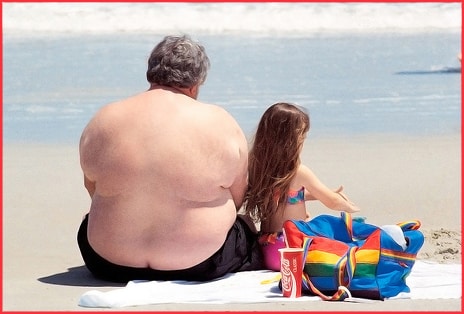
Recently, we brought news of several suggestions found in the year’s news, toward ending the obesity epidemic. Here are a few more.
Pick the Right Father
This is essential. Maren Kasselik reports on a childhood obesity study done by the Fathers and Families Program at the University of Newcastle in Australia:
Even if the mother was at a healthy weight, having an overweight father increased the odds of a healthy-weight child becoming obese by the age of 9 by 318 percent compared to kids whose parents were both at healthy weights. And if the child’s father was obese, those chances skyrocketed to 1,388 percent, according to the study, which was published in the International Journal of Obesity.
Having a healthy-weight father and an overweight or obese mother, however, didn’t affect the child’s odds of becoming overweight or obese at all. Looks like this one is all on you, Dad.
Why? It’s partly the instinctual “monkey see, monkey do” effect. Little boys want to be like their daddies, and so do little girls. An old saying goes, “Imitation is the sincerest form of flattery.” The response was put in us to guarantee survival, but nowadays it’s more likely to be counterproductive. Dad’s main role is “role model,” and if he does a less than stellar job, the kids inherit the karma.
The study author is Emily Freeman, Ph.D., who goes with that explanation. Others have other theories. Maybe it’s that fathers spend less time with the kids, and the time they do spend usually involves eating. So their influence in that area is stronger than the mother’s influence, which is diluted over many more activities and interactions.
In pragmatic terms, fathers can exert a lot of power over the family diet, even if they don’t personally shop or cook. Sometimes, kids don’t have a choice about whether to imitate Dad’s habits or not. Another problem is, in separated and divorced families where the mother has custody, fathers have a tendency to buy their children’s affection with food.
Take up EFT
A practice called EFT, or Emotional Freedom Techniques, is described as “a sophisticated cousin of acupuncture,” and is also known as psychological acupuncture. It involves tapping softly on one’s own pressure points while experiencing particular thoughts and emotions. It is said to have successfully treated phobias, post-traumatic stress disorder, and addiction. One type of healing said to have been accomplished by EFT is the banishment of food cravings.
One person who bears witness is Lynne Shaner, who used to have a serious problem with the usual suspects — sugar, pasta, fried foods, pizza. Shaner wrote,
A new study has shown that EFT curbs food cravings. We’ve known that anecdotally for a while, and I have personally experienced it in a fairly dramatic way, but it is nice to have the published study.
A ScienceDaily writer said,
Psychological acupuncture has been shown to be successful in reducing food cravings for up to six months in people who are overweight or obese… the impact on food cravings was almost immediate and long lasting. Food cravings significantly reduced after just four, two-hour sessions and were maintained at a six-month follow-up.
But wait, it also says,
… the study did not show any significant impact on body weight or body mass index (BMI) after six months…
Does this make sense? After six months without cravings, how could there not be an impact on body weight or BMI? If the loss of cravings does not lead to a loss of weight, why do so many people blame their extra pounds on those irresistible cravings?
The EFT is painless and easy to learn, and may be effective or not, depending. But teenagers tend to like weird ideas, and this might just be weird enough. If a technique has worked for even one person, why not give it a chance? It might be worth a try before undertaking, for instance, bariatric surgery.
Hide the Vegetables
Yoni Freedhoff, who also provides information on several “hide-the-veggies” cookbooks, offers this tip:
A recent study out of Volumetrics’ Barbara Rolls’ lab that found incorporating pureed vegetables into 3-5 year olds’ bread, pasta sauce, and chicken noodle casserole reduced energy intake in kids by 12%!… That’s not an insignificant, or unexpected reduction — decreasing the energy density of food by adding in piles of pureed vegetables means if you eat the same portion you always eat, you’ll consume fewer calories.
Work the Program
A while back, we mentioned the German doctoral candidate Adrian Meule, who shares many interests with Dr. Pretlow. Speaking of various modalities, Meule wrote,
But I think that obese individuals are a very heterogeneous group and that these interventions might not be appropriate for those who do not feel addicted.
Sometimes, that not-addicted feeling is called “denial.” As long as it’s operating, not much good can happen. The program works if you work the program, and that’s true across the board, for everything from Overeaters Anonymous and other 12-step programs to the “W8 Loss 2 Go” iPhone app.
Dr. Pretlow says,
There is a distinct difference between wanting to not be obese and wanting to give up the foods which cause it. Our app will work only for individuals who are willing to give up their problem foods. The individuals must also acknowledge that the foods are a problem for them.
Remember…
How many psychiatrists does it take to change a light bulb?
Only one, but the light bulb has to want to change.
Your responses and feedback are welcome!
Source: “Are You Making Your Kid Fat?,” Men’s Health News, 10/20/11
Source: “Curbing Food Cravings with EFT,” EFT Praxis, 05/13/10
Source: “Tapping Away Desire for Those Favorite Foods and Snacks,” ScienceDaily, 04/23/10
Source: “Hidden vegetables for one and all!,” Weighty Matters, 08/09/11
Image by Kyle May, used under its Creative Commons license.

 FAQs and Media Requests:
FAQs and Media Requests: 











